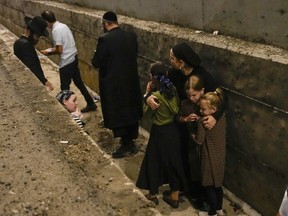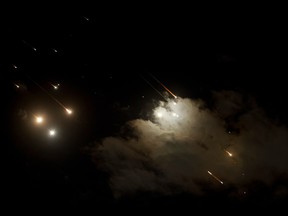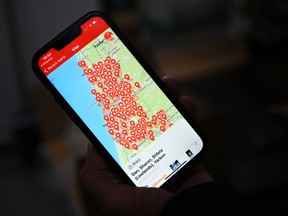Israel’s Iron Dome deflected most of the strikes and there were no reports of serious injury

Article content
Fears heightened that the Middle East is on the brink of war after Iran fired a barrage of ballistic missiles at Israel Tuesday evening, forcing the entire civilian population to be ordered into bomb shelters as sirens sounded across the country.
Iran took responsibility in a statement read aloud on state television. In its statement, Iran referenced Hezbollah leader Hassan Nasrallah and Revolutionary Guard Gen. Abbas Nilforushan, both killed in an Israeli airstrike last week in Beirut. It also mentioned Ismail Haniyeh, a top leader in Hamas who was assassinated in Tehran in a suspected Israeli attack in July. It warned the attack represented only a “first wave,” without elaborating.
Advertisement 2
Article content
Israel’s Iron Dome deflected most of the strikes, though some landed in central and southern Israel. There were no reports of serious injury.

U.S. President Joe Biden, who with Vice President Kamala Harris monitored the attack from the White House Situation Room, directed the U.S. military to assist in Israel’s defence and to shoot down missiles targeting Israel.
U.S. ships and aircraft are positioned in the region.
Israel warned there would be severe consequences for Iran, which backs the terror group Hezbollah in Lebanon.
“There was a serious attack on us and there will be serious consequences,” Rear Adm. Daniel Hagari, the IDF spokesman, said in a televised address.
“We have plans, and we will act in the time and place we decide,” he said.
Earlier on Tuesday Israel had informed Washington that an attack from Iran was imminent.
Over an hour Tuesday night, Iran fired nearly 200 missiles. The targets are believed to have been three Israeli Air Force bases, as well as an IDF military intelligence headquarters just north of Tel Aviv, which was reportedly evacuated on Tuesday afternoon.
Article content
Advertisement 3
Article content
Orders to shelter in place were sent to Israelis’ mobile phones and announced on national television.

“The air-defence system is fully operational, detecting and intercepting threats wherever necessary, even at this moment,” Hagari said. “However, the defence is not hermetic.”
Moments before Iran launched its missiles, a shooting attack in Tel Aviv left six people dead and three seriously wounded, police said.
A police officer on the scene said the terrorist attack involved at least two gunmen who exited a train car and opened fire at people waiting at one of the light-rail stations in Jaffa, a mixed Arab-Jewish neighbourhood in southern Tel Aviv.
The suspected gunmen were killed, police said.
At a hotel in West Jerusalem, guests hunkered down in a stairway, mostly joking and passing around water bottles amid waves of sirens signalling the threat of a missile strike. For others the fear was palpable: One older man drank straight from a bottle of whisky. Guests tried to calm a young woman who was crying.
Israel considers Iran to be its greatest foe — citing Iran’s repeated calls for Israel’s destruction, its support for terror groups and its nuclear program. Iran denies Israeli accusations that it is developing a nuclear weapon.
Advertisement 4
Article content
Israel Prime Minister Benjamin Netanyahu issued a warning Monday to Iran, which backs both Hezbollah and Hamas. “There is nowhere in the Middle East Israel cannot reach,” Netanyahu said.
Before Iran’s attack, Israel had landed a series of devastating blows in recent weeks against Hezbollah’s leadership in Lebanon. It then ratcheted up the pressure on the terrorist group — which has been firing rockets into Israel since the war in Gaza began — by launching what it said is a limited ground incursion in southern Lebanon.
Israel has said it will continue to strike Hezbollah until it is safe for citizens displaced from homes near the Lebanon border to return.
Hezbollah has vowed to keep firing rockets into Israel until there is a ceasefire in Gaza.
Hezbollah’s acting leader, Naim Kassem, said the group’s fighters are ready and the slain commanders have already been replaced.
Israel’s military said it killed a senior Hezbollah operative in an airstrike on an apartment building on the edge of Beirut on Tuesday.
The Israeli military said Mohammed Jaafar Qassir was killed. It said Qassir was in charge of Hezbollah’s Unit 4400 that ships weapons from Iran to Lebanon and he supervised Hezbollah’s development of precision-guided missiles.
Advertisement 5
Article content
The Israeli military said Qassir also sent hundreds of millions of dollars to Hezbollah in recent years.
There was no immediate comment from Hezbollah on the Israeli claim.
Recommended from Editorial
Qassir’s brother Ahmad carried out a suicide attack in southern Israeli port city of Tyre in 1982 that killed dozens of Israeli soldiers. His death is marked annually as “Martyr’s Day.”
Israel and Hezbollah have traded fire across the Lebanon border almost daily since Oct. 8, the day after Hamas sent fighters into Israel and sparked the war in Gaza.
The Israeli operation is focused on dismantling Hezbollah’s infrastructure in villages in southern Lebanon, Hagari said. “We are focusing in the area of those villages, an area next to our border,” where Hagari said Hezbollah has built infrastructure to prepare for what he described as a planned attack similar to the one carried out in Israel by Hamas on Oct. 7.
“We’re not going to Beirut. We’re not going to the cities in southern Lebanon,” Hagari said, implicitly addressing concerns from international leaders that Israel’s incursion would be expansive. Hagari on Tuesday denied that Israel’s actions amount to an “incursion.”
Israel has struck Beirut and its suburbs, but Hagari said the operations by ground troops would not go that far north.
Article content







